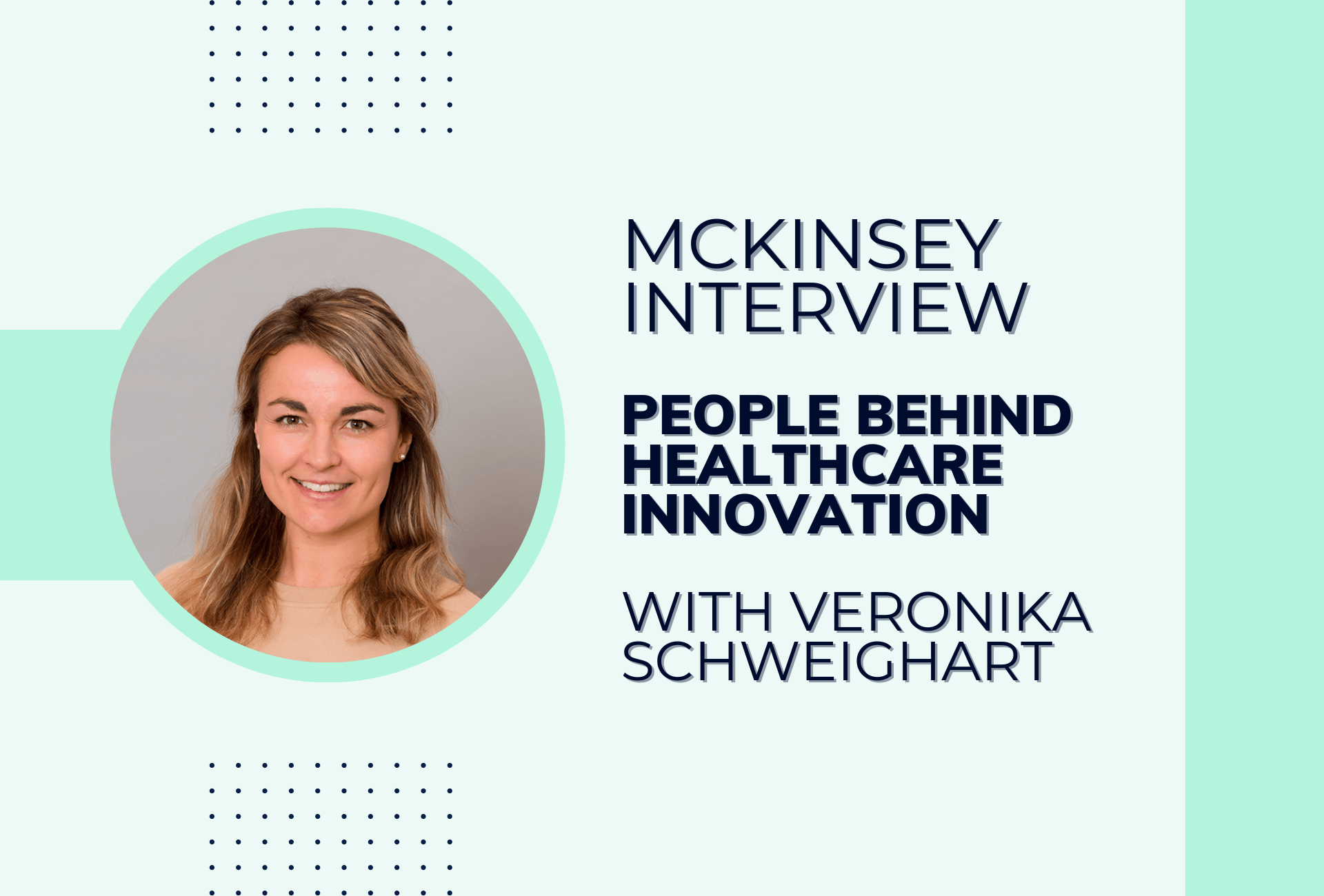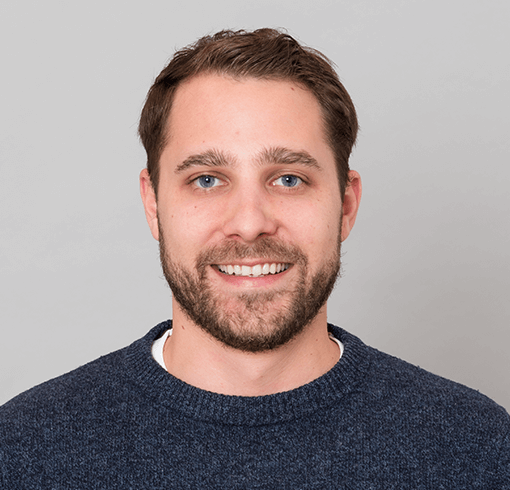People behind Healthcare Innovation: Our COO Veronika Schweighart Talks to McKinsey

DATE
June 22, 2023
AUTHOR
Sascha | Co-Founder & CEO
This article was first published by Pirkka Padmanabhan on LinkedIn.
Our COO and Co-founder Veronika Schweighart was recently featured in an interview series by McKinsey where they shine a light on the people behind healthcare innovation. She shared her experiences and lessons learned in the healthcare industry and gave valuable insights on our cloud-based software platform for hybrid clinical trials and observational studies. Here’s the interview:
Pirkka: What’s your story, and how did you become an innovator in healthcare?
Veronika: I had wanted to start my own company from a very early age, while my passion for improving human lives with digital technologies developed during my studies. For me, the most important prerequisite (in addition to passion) for becoming an innovator was to gain hands-on experience and to connect with skilled, like-minded people. That’s where the Center for Digital Technology and Management (CDTM)—a joint research and educational institute established by the Technical University Munich and the Ludwig-Maximilian University Munich—helped me the most. I was able to “dry run” a few start-up ideas in short and intensive real-world projects. Right after university, I founded my first technology start-up, Nuclino—a cloud-based knowledge-management software tool that allows teams around the world to collaborate and share information in real time.
Later on, I co-founded Climedo with Dragan Mileski and Sascha Ritz, whom I had met at CDTM. We had all gained previous start-up experience by then and, unfortunately, we had all also had some negative experiences in our close family environment with inefficient healthcare treatments, some of which had serious side effects. Our motivation was therefore to combine our passion for digital technology with the purpose of fundamentally improving the healthcare system.
Following an intensive exchange with leading physicians, we realized that there is enormous potential in the digitalization of clinical trials, both in academia and the industry. For example, many companies are still working with paper-based methods, Excel sheets, or very old-fashioned electronic data-capture systems in their trials, which makes processes much less efficient and more error prone—and thus, also more expensive in the long run. Furthermore, these methods don’t typically integrate with other, modern solutions, such as patient diaries, real-time data visualizations, telemedicine, or wearables. This makes it difficult to get a holistic view of the current trial status and to understand where there might be problems or inefficiencies. It’s therefore not surprising that 80% of traditional clinical trials finish later than planned and that 30% of patients drop out early.
Our solution Climedo enables all clinical trial stakeholders (patients, hospitals, and trial sponsors) to capture medical data in a structured way and to gain real-time insights. One way we do this is with our ePRO solution (“electronic Patient-Reported Outcome”), which enables patients to report on their health status from anywhere using their phone, without installing an app or logging into anything. It’s optimized for easy and self-explanatory BYOD (“bring your own device”) usage. The ePRO questionnaire can be complemented with objective data from a wearable (such as a smartwatch) which can track a patient’s heart rate, step count, sleep quality, and so on.
Moreover, if the study design and the respective access rights allow for it, all stakeholders who are involved in the clinical trial can see medical outcomes and process KPIs in the form of visualized charts. All collected data points and their evaluation can be accessed in real time, which is something that makes our system unique over others. As a result, the safety and efficacy of treatments can be evaluated much more easily and quickly, which ultimately leads to better treatment outcomes for patients.
Pirkka: Where do you see the clinical trial space moving to in the next ten years?
Veronika: In the face of COVID-19, the clinical trial space has become increasingly remote, digital, and decentralized. This offers tremendous opportunities both for trial sponsors and patients. For sponsors, it means that they can enroll a larger number of patients, thus creating a higher level of diversity and a better data set. Patients, on the other hand, can take part even if they live in remote areas or are simply not well enough to take part in a traditional clinical trial. This will also significantly increase the diversity in clinical trials which is very much needed.
I believe that this trend is here to stay beyond the pandemic, as the benefits clearly speak for themselves. We’re also seeing this evolution in our customer projects and demands. Furthermore, there is already a rise in the use of new technologies, such as wearables and telemedicine, which are increasingly being integrated into clinical trials. This will further support the efficient capture of data in real-world settings—straight from the patient. As a result, we will gain improved and much earlier insights about the efficacy and safety of treatments for patients with specific characteristics; this, in turn, will lead to better, highly personalized treatment options for everyone. I believe that this is what the future of clinical trials will look like: one seamlessly connected, decentralized ecosystem, focused on the needs of each person rather than companies or separate diseases.
Pirkka: Looking more broadly, what are the biggest opportunities and obstacles you see for innovation in the healthcare environment?
Veronika: In terms of opportunities, I think healthcare can become a lot more patient centric, meaning actively understanding the patient’s needs and putting them at the heart of the system. It also means making access to clinical trials more convenient and user-friendly: for example, allowing patients to join a clinical trial from the comfort of their home, rather than traveling to a physical study site. In fact, a report—Global Virtual Clinical Trials Markets (2021-2028)[1]—has found that 75% of clinical trial participants prefer mobile studies to traditional ones.
One obstacle we see here in Germany is definitely how difficult it is to access anonymous data for research purposes. Digital solutions “made in Germany” probably fulfill the world’s highest data protection standards and we can be really proud of that. At the same time, using real-world medical data for research purposes in an anonymous way is one of the biggest opportunities to improve treatment outcomes.
Thus, we should see digitalization and the use of medical data in Germany’s highly protected environment as an opportunity instead of a threat and follow the example of countries such as Estonia, where a high level of digitalization, data sharing, and data protection are closely connected.
Pirkka: When you look at the health system as a whole (providers, payers, doctors, patients) who do you see driving innovation the most?
Veronika: As in many industries, it’s clear that start-ups are at the forefront of innovation. This goes for healthcare too, as start-ups in this industry are often more agile and risk-taking than healthcare incumbents. At the same time, I believe that patients have a huge potential to drive innovation as well, but we as companies and service providers need to give them the space to do so, listen to their needs, and embed their feedback in our daily work and processes. For example, companies are involving patient advocates and patient organizations in their research processes more and more, which is a great first step, as it’s impossible to know how a patient really feels without having had the disease yourself.
Pirkka: In your opinion, what is the single most important change that will better enable digital transformation in health systems?
Veronika: One important condition for successful digital transformation in health systems is the adoption of digital tools by end users—doctors, nurses, and patients—but these users will only be ready to accept using digital technologies at scale if they can see and feel their benefits.
In Europe, people are often afraid of radical changes given the risk of failure. My advice is therefore to take an approach similar to the one of testing a new idea in a start-up: divide a digital transformation project into small chunks, set up hypotheses about the benefits, test them in small groups with tight feedback loops, measure results quickly, learn from them, and adjust accordingly. As soon as the benefits are visible, add more chunks of the project and repeat the cycle again and again.
In a nutshell, for digital transformation to happen in Europe, policymakers and health corporations should adopt an entrepreneurial mindset: think big, start small, and move fast.
Pirkka: What do you know now that you wish you had known when you were starting out as an innovator?
Veronika: The concept “think big, start small, move fast” has always been my mantra as an innovator, but when founding my first start-up, I definitely underestimated how important it is to really focus on one thing at a time without being distracted by other options.
One typical characteristic of an innovator is their ability to spot opportunities by always looking out for new ideas or concepts. This is an incredibly valuable trait, as it facilitates creativity and innovation. At the same time, however, it can distract us from the most essential things that need to be done in order to move the company forward.
Over time, I learned how to create the right balance between zooming out (defining and adjusting the company’s strategy) and zooming in (building the product, talking to customers) to achieve our goals.
Disclaimer: The views and opinions expressed in this article are solely those of the author and his guest contributor and do not reflect the views of McKinsey & Company.
Read the interview and connect with Pirkka and on LinkedIn!






